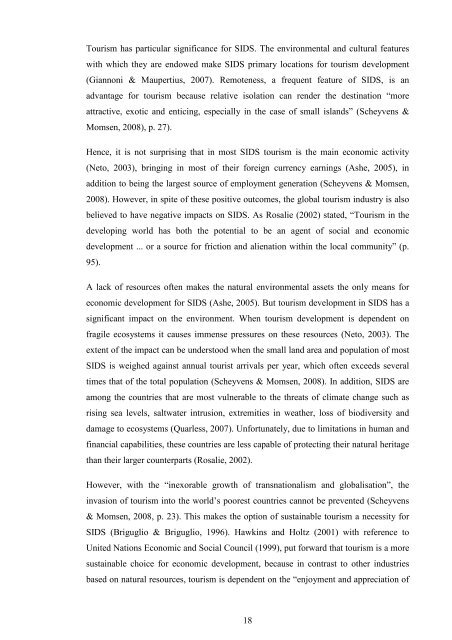The Role of Local Food in Maldives Tourism - Scholarly Commons ...
The Role of Local Food in Maldives Tourism - Scholarly Commons ...
The Role of Local Food in Maldives Tourism - Scholarly Commons ...
You also want an ePaper? Increase the reach of your titles
YUMPU automatically turns print PDFs into web optimized ePapers that Google loves.
<strong>Tourism</strong> has particular significance for SIDS. <strong>The</strong> environmental and cultural features<br />
with which they are endowed make SIDS primary locations for tourism development<br />
(Giannoni & Maupertius, 2007). Remoteness, a frequent feature <strong>of</strong> SIDS, is an<br />
advantage for tourism because relative isolation can render the dest<strong>in</strong>ation “more<br />
attractive, exotic and entic<strong>in</strong>g, especially <strong>in</strong> the case <strong>of</strong> small islands” (Scheyvens &<br />
Momsen, 2008), p. 27).<br />
Hence, it is not surpris<strong>in</strong>g that <strong>in</strong> most SIDS tourism is the ma<strong>in</strong> economic activity<br />
(Neto, 2003), br<strong>in</strong>g<strong>in</strong>g <strong>in</strong> most <strong>of</strong> their foreign currency earn<strong>in</strong>gs (Ashe, 2005), <strong>in</strong><br />
addition to be<strong>in</strong>g the largest source <strong>of</strong> employment generation (Scheyvens & Momsen,<br />
2008). However, <strong>in</strong> spite <strong>of</strong> these positive outcomes, the global tourism <strong>in</strong>dustry is also<br />
believed to have negative impacts on SIDS. As Rosalie (2002) stated, “<strong>Tourism</strong> <strong>in</strong> the<br />
develop<strong>in</strong>g world has both the potential to be an agent <strong>of</strong> social and economic<br />
development ... or a source for friction and alienation with<strong>in</strong> the local community” (p.<br />
95).<br />
A lack <strong>of</strong> resources <strong>of</strong>ten makes the natural environmental assets the only means for<br />
economic development for SIDS (Ashe, 2005). But tourism development <strong>in</strong> SIDS has a<br />
significant impact on the environment. When tourism development is dependent on<br />
fragile ecosystems it causes immense pressures on these resources (Neto, 2003). <strong>The</strong><br />
extent <strong>of</strong> the impact can be understood when the small land area and population <strong>of</strong> most<br />
SIDS is weighed aga<strong>in</strong>st annual tourist arrivals per year, which <strong>of</strong>ten exceeds several<br />
times that <strong>of</strong> the total population (Scheyvens & Momsen, 2008). In addition, SIDS are<br />
among the countries that are most vulnerable to the threats <strong>of</strong> climate change such as<br />
ris<strong>in</strong>g sea levels, saltwater <strong>in</strong>trusion, extremities <strong>in</strong> weather, loss <strong>of</strong> biodiversity and<br />
damage to ecosystems (Quarless, 2007). Unfortunately, due to limitations <strong>in</strong> human and<br />
f<strong>in</strong>ancial capabilities, these countries are less capable <strong>of</strong> protect<strong>in</strong>g their natural heritage<br />
than their larger counterparts (Rosalie, 2002).<br />
However, with the “<strong>in</strong>exorable growth <strong>of</strong> transnationalism and globalisation”, the<br />
<strong>in</strong>vasion <strong>of</strong> tourism <strong>in</strong>to the world’s poorest countries cannot be prevented (Scheyvens<br />
& Momsen, 2008, p. 23). This makes the option <strong>of</strong> susta<strong>in</strong>able tourism a necessity for<br />
SIDS (Briguglio & Briguglio, 1996). Hawk<strong>in</strong>s and Holtz (2001) with reference to<br />
United Nations Economic and Social Council (1999), put forward that tourism is a more<br />
susta<strong>in</strong>able choice for economic development, because <strong>in</strong> contrast to other <strong>in</strong>dustries<br />
based on natural resources, tourism is dependent on the “enjoyment and appreciation <strong>of</strong><br />
18

















